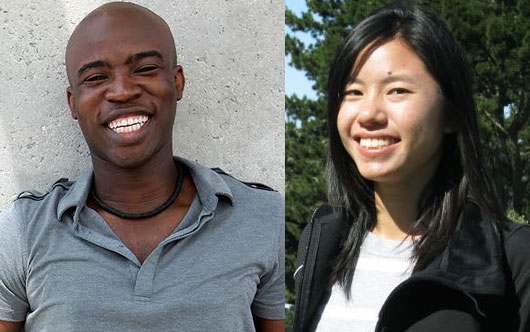Graduate Students Selected Public Impact Fellows
 Nov. 25, 2015 - Two Samueli School doctoral candidates are among only four UC Irvine graduate students to be named 2016 UC Irvine Public Impact Distinguished Fellows by the university’s Graduate Division. Julius Edson (chemical engineering and materials science) and Elena Liang (biomedical engineering) are recipients of the fellowship, which includes a $10,000 award.
Nov. 25, 2015 - Two Samueli School doctoral candidates are among only four UC Irvine graduate students to be named 2016 UC Irvine Public Impact Distinguished Fellows by the university’s Graduate Division. Julius Edson (chemical engineering and materials science) and Elena Liang (biomedical engineering) are recipients of the fellowship, which includes a $10,000 award.
The Public Impact Fellowship supports doctoral students whose research has the potential to significantly improve or enrich local, national or global communities.
In addition to the prospective impact of their work, Edson, who studies ways to combat drug-resistant microbes, and Liang, who is working to design an artificial cornea that uses nanotopography to control cell adhesion, were chosen based on presentations, interviews, academic records, letters of recommendation and their ability to convey their research succinctly to a broad audience.
Edson earned a bachelor’s degree in chemical engineering from City College of New York, and a master’s in chemical and biochemical engineering from UCI. Alongside his graduate adviser, pharmaceutical sciences professor Young Jik Kwon, Edson researches nanoantibiotics and the synthesis of multifunctional nanomedicine drug molecules.
“Drug-resistant microbes are becoming a pressing concern,” Edson says. Specifically, he is modifying a biopolymer called chitosan, a natural nanomaterial that affects the growth of certain microbes. These modification techniques aid the material’s gene-delivery capabilities without hindering its innate antimicrobial properties. “This hopefully will create a therapy that will not only kill the microbes, but also weaken or eliminate drug resistance,” he adds.
Liang works with her adviser, Albert Yee, professor of chemical engineering and materials science, to design artificial corneas from nanomaterials that can adhere better to patients’ own cells. “Currently, the majority of implanted artificial corneas fail because the patient’s own cells cannot adhere well to the surface of the implant, causing surrounding cells to die. If the cells do adhere, they can grow uncontrollably in the wrong regions, also resulting in a failed implant,” says Liang, who received a bachelor’s degree in bioengineering from UC Berkeley and a master’s in biomedical engineering from UCI. “Therefore, we need an artificial cornea that enables cells to attach to the periphery of the device while limiting attachment in the center region.”
Both Edson, who hopes to become an entrepreneur, and Liang, who is leaning toward a career in academia, are grateful for the recognition. “The public impact fellowship is a wonderful honor,” Edson says. “Not only does it allow me the opportunity to share my research with a diverse audience, but hopefully it will also galvanize others to pursue research in developing novel antimicrobials.”
Adds Liang: “Receiving this award is a tremendous honor and invaluable for achieving my research and career goals. I am encouraged that my work is recognized by the Graduate Division for the potential of improving not only artificial corneas, but also for other biomedical implants. I am determined to continue this research and develop a testing prototype during the rest of my time here at UC Irvine.”
The Public Impact Fellowship program also selected 10 UCI graduate students for honorable mention awards of $1,000 each. Mary Dickson, chemical engineering and materials sciences, was among the recipients.Dickson, who also works with Yee, is modifying the surface of ordinary plastics to incorporate nanoscopic spikes that can puncture and penetrate bacteria on contact. By making plastic antibacterial without using drugs or chemical biocides, Dickson believes the material can have wide-ranging applications in medical devices and environmental surfaces.
-Anna Lynn Spitzer
